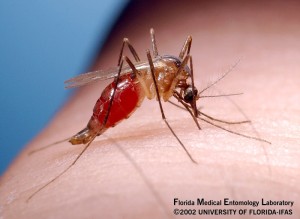
Here’s a list of a few of the things that I said I wanted to be ‘when I grow up’: an astronaut, a doctor, a lawyer, a dolphin trainer, or a marine biologist. As it turns out, I’m none of these things, and I’m not meant to be any of these things.
My name is Samantha Yost and I am going into my sixth year as a graduate student at Rutgers University in the Microbiology and Molecular Genetics program. I am currently in a structural microbiology lab under the tutelage of Dr. Joseph Marcotrigiano of the Center for Advanced Biotechnology and Medicine. In our lab we use biophysical and biochemical methods to study viral proteins, including those from some very threatening and/or emerging human pathogens such as hepatitis C virus, HIV, and Chikungunya virus.
I began my post-high school education in marine biology but quickly realized that plankton and seaweed just weren’t for me. During my second year, I took a required ‘General Genetics’ course which was the first turn on the path to where I am today. In 2008, I received a Bachelor of Science degree from the Florida Institute of Technology (FIT) in Molecular Biology, and immediately started my master’s degree at FIT in Biotechnology. Concurrently to my two year master’s program, I was a laboratory technician at the Florida Medical Entomology Laboratory (FMEL) at a University of Florida site in Vero Beach, Florida. Through FMEL, I was able to dabble i n assessing vector competence of mosquitoes, surveying Florida mosquito populations, and working with human pathogens such as West Nile virus. This experience was a major turning point of my career; FMEL brought these tiny, infectious machines to the forefront of my attention.
n assessing vector competence of mosquitoes, surveying Florida mosquito populations, and working with human pathogens such as West Nile virus. This experience was a major turning point of my career; FMEL brought these tiny, infectious machines to the forefront of my attention.
After receiving my Master of Science degree in 2010, I came to Rutgers University with aspirations of studying virology. My thesis project revolves around the non-structural proteins of Chikungunya virus and their functions during viral pathogenesis. Many viruses express their proteins as a long polyprotein as a mechanism to regulate their functions, and keep their genomes small. These polyproteins are cleaved by either viral or host proteases during the course of infection. Often, these proteolytic cleavages cause a change in the protein’s overall function or activity levels, leading the infection to progress. Very few viral non-structural polyproteins have been studied, and our hope is to design novel, targeted anti-viral therapies or vaccines against these viral polyproteins.
As for the future, while I’ve certainly narrowed down the field from doctor, astronaut, and marine biologist, I still believe I have a broad field ahead of me from which to choose. In the long term, I would like to continue in the field of infectious disease research, with my immediate next step being a post-doctoral training position. I hope you will enjoy exploring career options and learning how to focus your talents and passion for science with me through these iJOBS blogs!